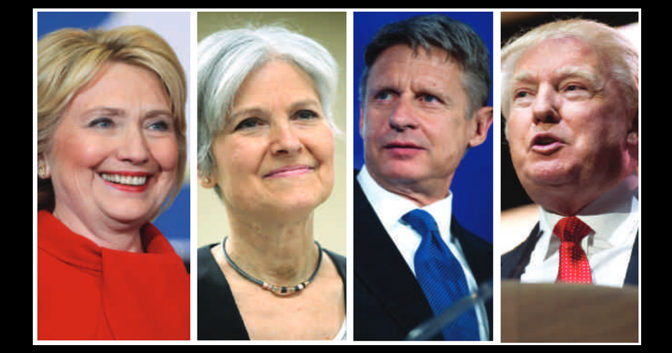Freedom Leaf’s Post-Convention Forecast

After all the speeches were delivered, protests held and balloons dropped, the primary and convention season finally came to a close on July 28 in Philadelphia. The 2016 presidential race is now officially a showdown between Democratic nominee Hillary Clinton and Republican nominee Donald Trump, even as third-party candidates Gary Johnson and Jill Stein continue to influence the contest.
Clinton has benefited most from the “post-convention bump” (and Trump’s continued self-inflicted controversies), with a solid lead in the polls. Here are several things to keep an eye on that could shake up the race.
Presidential Debates
The next high-profile events on the election calendar are the presidential debates, scheduled for Sept. 26 in Hempstead, N.Y., Oct. 9 in St. Louis and Oct. 19 in Las Vegas. Widely considered an extremely competent debater, Clinton brings a scholarly knowledge of policy and a calm demeanor that have treated her well in past debates. She’s pretty much the polar opposite of Trump.
Throughout the primary debates, Trump showed his ability to be agile and unpredictable. While this debating style is sometimes a huge liability for him, it also makes him hard to prepare for because opposing candidates never really know what he’s going to say.
The other variable in these debates is the potential inclusion of third-party candidates Johnson and Stein. Traditionally, the Presidential Debate Commission requires candidates to reach 15% in recent polling to qualify for a podium on the debate stage. Neither candidate has hit that threshold, but Johnson has come the closest, polling as high as 13% in some surveys.
Third Parties in the Mix
The inclusion of the Libertarian Party’s Johnson and/or the Green Party’s Stein in the debates would take the race into uncharted territory. Part of the challenge for third parties has always been lack of funds, scant media coverage and low national recognition of both their platforms and candidates. Getting on the debate stage would expose them to millions of voters who may have never heard of them, and who might side with their policy positions.
Given that both Clinton and Trump have the highest unfavorability ratings of any major-party nominees in U.S. political history, the climate is ripe for a potential third-party breakthrough. In 1992, independent candidate Ross Perot received 18.9% of the popular vote. While he failed to win any states, his candidacy is widely considered to have given Bill Clinton the edge he needed to overtake George H.W. Bush, winning with just 43% of the vote; in 1912, Teddy Roosevelt, the most successful third-party candidate in presidential election history, finished second to Democrat Woodrow Wilson, with 27.4% of the vote.
Even if Johnson or Stein fail to qualify for the debates, their impact on the election continues to be felt. Johnson has been picking up a lot of support from disaffected Republicans upset by Trump’s antics, and from Bernie Sanders supporters drawn to Johnson’s socially liberal and anti-interventionist policies. Stein, while currently lagging behind Johnson, is backed by the progressive left, which views Clinton as corrupt and far too centrist.
The Trump Factor
After receiving a nice boost in the polls coming out of the Republican National Convention, things started to look up for the GOP nominee. However, Trump sabotaged himself the week after the Democratic National Convention by spending days attacking a deceased Gold Star military veteran’s family. While there’s still plenty of time for him to recover, he remains his own worst enemy.
If Trump can avoid making further inflammatory statements between now and the general election on Nov. 8, and instead focus heavily on his trade and economic policies, he could potentially climb back up in the polls and make it a truly contentious race, especially in swing states like Ohio and Pennsylvania. After the disastrous weeks following the conventions, rumors began circulating that Trump might drop out of the race; this appears to be wishful thinking among the GOP party elite.
Marijuana as a Wedge Issue
With Sanders no longer around to call for descheduling, discussion of marijuana has largely been absent from the race. The Clinton/Kaine ticket is on record as supporting a “pathway to legalization,” and allowing states to implement their own marijuana policies. While most of Clinton’s previous statements on the topic have only called for further cannabis research and perhaps a potential rescheduling to Schedule II, the ticket has not shown an aversion to reforming cannabis policies. The Democratic Party platform also includes very strong language calling for dialing back the War on Drugs.
Trump, on the other hand, is a bit more of a mixed bag. While he’s on record supporting medical marijuana and states’ rights, Trump opposes full legalization. It also doesn’t inspire much confidence that he’s surrounded himself with ardent prohibitionists like VP pick Mike Pence and potential Attorney General Chris Christie. The Republican Party platform doesn’t even support medical marijuana, which is now legal in 26 states.
The best chance for the candidates to make further statements on this issue will be during the debates, and, with marijuana initiatives on the ballot in as many as nine states, it’s likely the topic will come up at least once. Perhaps the first debate’s agriculturally historic location—Hempstead—will encourage a cannabis conversation.
If you enjoyed this Freedom Leaf article, consider subscribing today!

